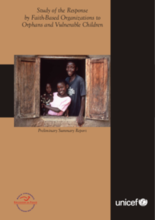International agencies are increasingly recognizing the role of religious organizations in establishing effective HIV/AIDS interventions. Despite some negative perceptions of their role and impact, faith-based organizations (FBOs) are among the most viable institutions at both local and national levels and have developed experience in addressing the multidimensional impact of AIDS and its particular impact on children.
Religious organizations are prevalent throughout Africa. In the six countries chosen for this Study, the number of local congregations is estimated to be in excess of 150,000. Yet most faith-based responses are small scale and remain undocumented. It is difficult to measure their cumulative impact compared to the more visible project responses of development agencies. Consequently, FBO HIV/AIDS activities remain undersupported. During 2002 - 2003, the World Conference of Religions for Peace (WCRP) in collaboration with UNICEF carried out a study to survey what religious groups are doing to meet the needs of orphans and vulnerable children (OVC) and to develop an improved and detailed understanding of the responses of religious organizations in east and southern Africa in caring for children affected by AIDS.
The Study took place in six countries (Kenya, Malawi, Mozambique, Namibia, Swaziland and Uganda) with a combined population of 85.2 million people. There are currently around 5.8m orphans in these countries, with close to half being due to AIDS. This figure is set to increase to 6.9m by 2010 by which time some 1.4m children (20% of orphans and 3% of the child population) will have lost both parents. Research teams in the six countries conducted interviews with 686 FBOs, mostly congregations and Religious Coordinating Bodies (RCBs) that coordinate the religious activities carried out by congregations. Over 7,800 volunteers supported more than 139,400 OVC in these initiatives, mostly through community-based initiatives involving spiritual, material, educational and psychosocial support. Though many individual congregational initiatives supported under 100 children, the cumulative results are significant. The overall organizational capacity of local FBOs in terms of governance and financial accountability was on a par with many larger NGOs.
©UNICEF and World Conference of Religions for Peace

